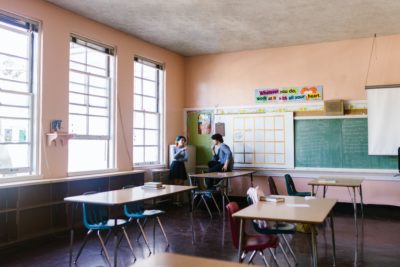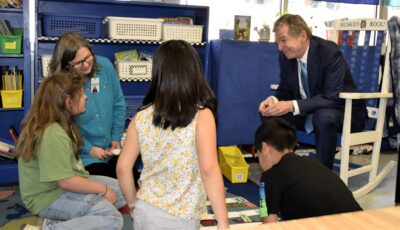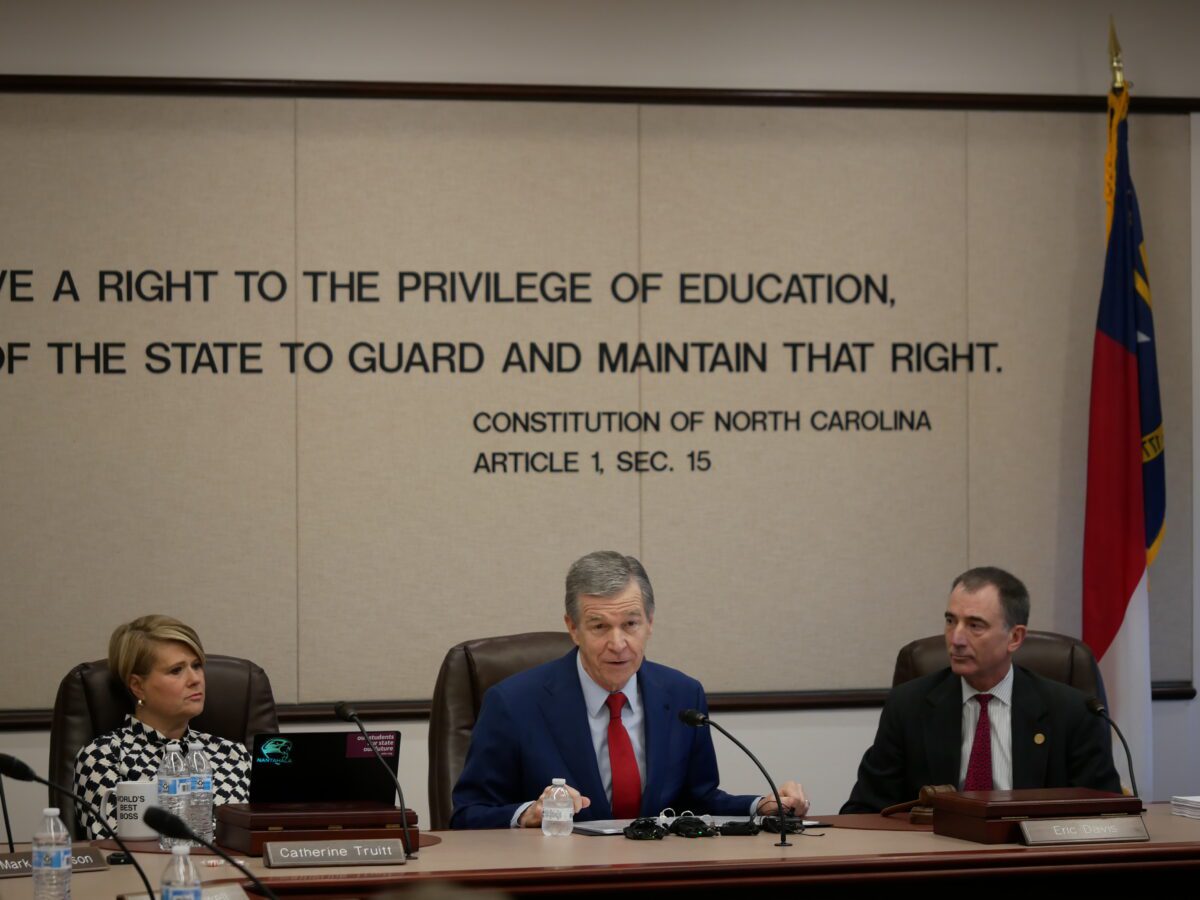
|
|
Democratic Gov. Roy Cooper joined the State Board of Education’s meeting on Thursday morning to discuss the importance of fully funding North Carolina’s public schools.
“This Board has an enduring commitment to preserving our state’s great public school system and the importance of recruiting, developing, and retaining high-quality, dedicated teachers,” State Board Chair Eric Davis said to introduce Cooper at the start of Thursday’s meeting. “We’re fortunate to have a governor who is a champion of our public schools.”
Last May, Cooper issued a state of emergency for public schools after the Republican-led General Assembly introduced legislation to expand school choice statewide. Since then, Cooper also declared 2024 “The Year of Public Schools,” visiting 38 places across the state to talk about the importance of public schools.
“Our public schools are doing amazing work,” Cooper said.
Cooper highlighted the state’s record graduation rate (87%), number of credentials earned by students last year (325,000), highest number of nationally board certified teachers in the country (24,243), and bipartisan efforts to strengthen literacy through the science of reading.
Sign up for the EdWeekly, a Friday roundup of the most important education news of the week.
He also pointed to the state’s “nationally renowned pre-K programs,” while calling for their expansion.
“There are hundreds of other examples that I can give you that I’ve personally seen and that I know about and that people in this room deserve a lot of credit for,” Cooper said. “But I think the bottom line is North Carolina public schools rock. They do.”
Cooper asked Board members to join him in lobbying for a moratorium on private school voucher expansion until public schools are fully funded.
His comments come as nearly 72,000 new Opportunity Scholarship applications were completed this year, following the expansion of the program last long session. Among other things, Cooper raised concerns about the lack of accountability at private schools, the lack of student services at many private schools, and the potential impact of the expansion on the funding and enrollment of public schools.
“The State Board of Education, the Superintendent of Public Instruction, and the legislature, and I are constitutionally charged with ensuring that our students have the opportunity for a sound basic education, and when we send taxpayer dollars to private schools to educate our students without any follow up or accountability, we’re shirking that responsibility,” Cooper said. “And let me be really clear, I’m not against private schools. But I am against taxpayer money going to private schools to at the expense of public schools.
Cooper’s comments led to a bipartisan discussion on the value of public schools in our state.
Read more about public schools
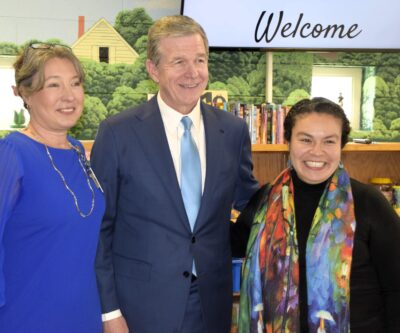
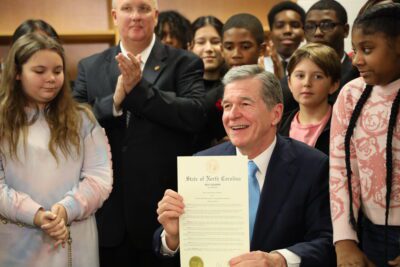
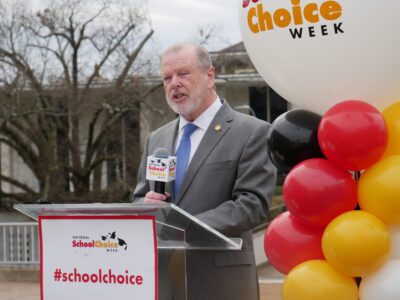
Lt. Gov. Mark Robinson: ‘We want a world class system that delivers in every corner of the state’
Republican Lt. Gov. Mark Robinson — the Republican nominee for North Carolina’s next governor — was the only Board member to explicitly support Opportunity Scholarships. He said “giving parents absolute control of their children’s educational destiny” is the key to “having a diverse public education system.”
“I’m not concerned so much about ‘sound, basic education,’ what we want is excellence,” Robinson said. “We don’t want just a sound, basic education, we want a world class system that delivers in every corner of this state. And I believe that’s what we need to drive for.”
Robinson agreed that the state needs to pay, respect, and protect teachers more.
Superintendent Catherine Truitt: Incredible public education is the cornerstone of our democracy
State Superintendent Catherine Truitt, a Republican, said public schools need more money. However, she called on the State Board to develop a roadmap, noting the Leandro comprehensive remedial plan was developed before the pandemic and implementation of the science of reading statewide.
She also noted challenges facing public schools, including teacher pay, an outdated school calendar, and “an accountability model that is broken.”
“I know we need to spend more on education, but we don’t have a roadmap to do that right now,” Truitt said. “While I don’t disagree that we need to spend more, it’s how we spend the money that matters.”
Truitt called for more than the sound basic education that is constitutionally required, urging a roadmap for “an incredible public education, which is the cornerstone of our democracy.”
Cooper said an easy place to start is paying teachers “substantially more.”
Chair Davis agreed the Leandro Comprehensive Remedial Plan (CRP) needs updating. You can view EdNC’s latest report on oral arguments in the case here.
“I agree with the superintendent that we have a lot of opportunities to improve the education system in North Carolina,” Davis said. “Improving the system starts with a rededication to the importance of the public education system in North Carolina.”
The superintendent serves as the secretary and chief administrative officer to the Board.
The State Board of Education: The economy, especially in rural areas, depends on public schools
Several Board members spoke about the importance of public school education to the state’s economy. Cooper said that North Carolina will not maintain its first in business title without investing in public school education.
Board member Jill Camnitz said that public schools are the school of choice for most families. She also highlighted the choice available to families within public education. Public schools offer an abundance of choice for students and parents: year round, charter, restart schools, language immersion, single sex, early college, career academies, virtual academies, alternative schools, laboratory schools, many magnet options, newcomer schools, and more.
Board member Wendell Hall, from Hertford County, spoke about the importance of public education in rural counties. Cooper noted that public school districts are the largest employer in many rural counties, and that rural counties often lack funds for much-needed infrastructure investments.
Cooper encouraged state leaders to keep children at the front of these conversations.
“Our public schools are one of the issues that should bring us together,” he said. “I know that these discussions can get contentious. I do think it’s important to remember we are focusing on these children who are our future and in all our discussions. Let’s just make sure we keep them at the forefront.”
Cooper, who visited Hertford County Early College High School after the discussion with the Board, urged the board to prioritize visiting schools and talking with educators. He encouraged them to ask their school boards, school and district administrators, educators, parents, and business and community leaders to talk with their legislators about four things:
- Great things are happening in our public schools;
- Stop expansion of private school vouchers until public schools are fully funded;
- Pay teachers like the professionals they are; and
- Expand access to more quality early childhood education.
“The future of our state goes to class every day in a public school,” Cooper said. “And we have to invest in that future.”
Recommended reading
